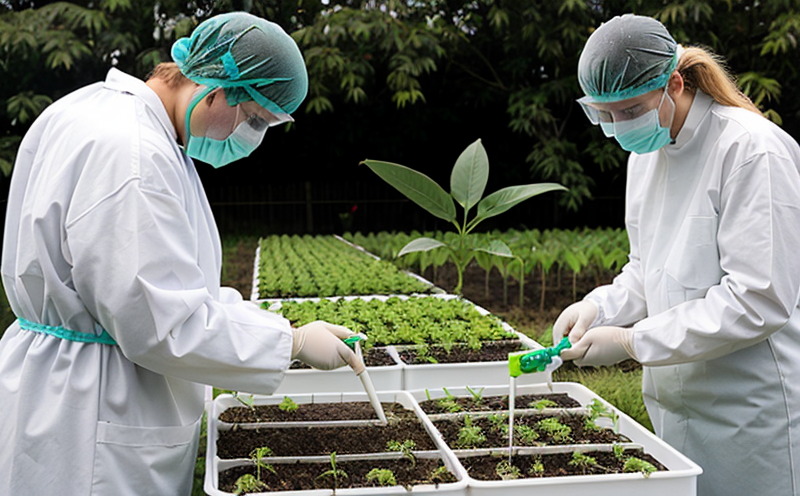Peanut Mottle Virus Testing
The Peanut Mottle Virus (PMoV) is a significant pathogen affecting peanut crops worldwide. This virus can severely impact plant health, leading to reduced yields and compromised product quality. Accurate detection and identification of PMoV are crucial for effective management strategies in agriculture and forestry sectors. In this article, we will delve into the intricacies of Peanut Mottle Virus Testing, detailing its importance, methodologies, benefits, applications, and how Eurolab can support your needs.
Peanut Mottle Virus is a member of the Potyviridae family and is primarily transmitted through mechanical means such as contaminated tools or equipment. It can also spread via aphids, which are common vectors in agricultural settings. The virus manifests symptoms like mottling, yellowing, and necrosis on leaves, stems, and pods, making it critical to identify early stages of infection for timely interventions.
In the context of agriculture and forestry testing, accurate identification of PMoV is vital not only for crop health but also for maintaining market integrity. Consumers are increasingly concerned about food safety and traceability, which means that producers must ensure their products meet stringent quality standards and regulatory requirements. Reliable detection methods help prevent contaminated crops from reaching consumers, thereby safeguarding both public health and economic interests.
The testing process typically involves collecting leaf samples from suspected plants followed by extraction of viral nucleic acids using standardized protocols. Real-time PCR (RT-PCR) is the most commonly used technique due to its high sensitivity and specificity. This method allows for precise quantification of viral loads, providing valuable information on the extent of infection within a field or batch.
Given the economic importance of peanut crops globally, accurate diagnostics play an essential role in controlling PMoV outbreaks. By identifying infected plants early, farmers can implement targeted treatments that minimize damage to healthy portions of their fields while reducing overall pesticide use. Additionally, knowing the presence of specific pathogens enables better decision-making regarding crop rotation and pest management practices.
For quality managers and compliance officers responsible for ensuring product safety and adherence to regulations, reliable testing ensures they can meet these goals effectively. Understanding how different factors such as environmental conditions or farming practices might influence disease prevalence helps tailor interventions appropriately. Furthermore, having access to accurate diagnostic tools allows stakeholders across the supply chain—from farmers to processors—to make informed decisions that enhance sustainability efforts.
Effective control measures require precise identification of infected areas within fields or batches, allowing for targeted treatment and minimizing spread. Early detection also aids in preventing contaminated products from entering markets where they could pose risks to consumers' health and safety. By leveraging advanced testing technologies like RT-PCR coupled with robust bioinformatics pipelines, laboratories can provide timely results essential for decision-making processes throughout the supply chain.
Benefits
Accurate Peanut Mottle Virus Testing offers numerous benefits across various sectors:
- Enhanced Crop Health: Early detection enables farmers to take corrective actions promptly, reducing losses due to viral infections.
- Improved Product Quality: Ensuring that only healthy peanuts reach the market enhances consumer trust and satisfaction levels.
- Sustained Compliance: Meeting regulatory requirements becomes easier when you have reliable diagnostic tools at your disposal.
- Economic Growth: By minimizing outbreaks, producers can maintain profitability and competitiveness in local and international markets.
Industry Applications
Peanut Mottle Virus Testing finds application across multiple industries including agriculture, food processing, and biosecurity. For instance:
- Agriculture: Farmers use this testing to monitor fields for early signs of infection before they escalate into full-blown outbreaks.
- Food Processing: Manufacturers incorporate these tests as part of their quality assurance programs ensuring that only uncontaminated peanuts are used in production processes.
- Biosecurity: Governments and organizations use this testing to prevent the introduction or spread of harmful pathogens into controlled environments.
Eurolab Advantages
At Eurolab, we offer comprehensive Peanut Mottle Virus Testing services backed by state-of-the-art facilities and experienced scientists:
- Expertise: Our team consists of experts specializing in agricultural diagnostics who stay updated on the latest research findings.
- Accurate Results: Leveraging cutting-edge technology, we deliver precise and reliable test outcomes every time.
- Prompt Delivery: We understand how critical timely results are for effective decision-making; hence our turnaround times are fast.
- Compliance Assurance: Our protocols align with international standards ensuring that your testing meets all relevant regulatory requirements.





